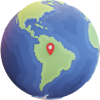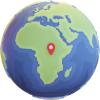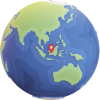Case studies are organised by region, with each region featuring links to the countries where the case studies are located.
Bolivia

The Verité report investigates forced labour indicators within Bolivia’s Brazil nut, cattle, corn, and peanut sectors. Human trafficking emerges as a critical issue, particularly in remote rural areas where workers face coercion and exploitation. Vulnerable individuals, often from marginalised communities, are trafficked and subjected to abusive recruitment practices, debt bondage, and inadequate living conditions. The report highlights that victims are frequently misled about the nature of their work, wages, and living conditions, leading to situations where they cannot freely leave or seek help. It underscores the necessity of stringent enforcement of labour laws, enhanced labour inspections, and support systems for victims to combat trafficking. The study calls for collaboration between governmental, non-governmental, and international entities to address the root causes and provide comprehensive support to affected workers. Ending trafficking and forced labour requires a multifaceted approach that includes regulatory oversight, victim protection, and education initiatives to raise awareness about these issues.
Keywords: Latin America, Bolivia, cattle, primary production, human trafficking, forced labour, modern slavery
Source: https://verite.org/wp-content/uploads/2016/11/Research-on-Indicators-of-Forced-Labor-in-the-Bolivia-Brazil-nut-Cattle-Corn-and-Peanut-Sectors__9.19.pdf
Honduras

Cattle can both themselves be laundered (if they are grazed on land that has been illegally cleared and converted to pasture) and used as a means of laundering criminal proceeds from other exploits, like drugs trafficking. In Brazil, cattle have been laundered to obscure their links to land clearing, when they are moved from ranches that have contributed to land conversion through “clean” ranches that have not resulted in recent forest loss.
In 2009, several Brazilian slaughterhouses signed the Terms of Adjustment of Conduct, an initiative of the Federal Prosecution Office and the Public Commitment on Cattle Ranching, and a voluntary protocol developed by Greenpeace, which precludes them from purchasing cattle reared on deforested land. However, a single cow might pass through up to 10 farms before it is slaughtered (from birth, through rearing and fattening). Any of these farms might be linked to illegal deforestation but many slaughterhouses assess links to deforestation only on the last farm a cow passes through - their direct supplier. As long as the last farm in the supply chain is from a “clean” ranch that is free from recent deforestation then slaughterhouses (and subsequent transporters and retailers, like supermarkets) are likely to mark them as deforestation-free, even if they have spent the majority of their life on and have passed through nine other ranches that have been converted from forested land. Indeed, data indicates that some ranchers own both “dirty” and “clean” ranches and launder cattle through their own properties. So long as one property is kept clean, they can continue to clear land for cattle grazing purposes on any number of other ranches.
Other investigations by Global Witness have found that ranchers have fraudulently edited the boundaries of their ranch once they have cleared areas of land, so that this land conversion is no longer included within the property’s scope and the ranch appears free from deforestation. This is alleged to be the case for the Fazenda Espora de Ouro II Ranch in Brazil’s Pará state, which Global Witness also found appears to be registered in the name of an individual who could not legally be its owner (based on assessment of a database of land titles and beneficiaries).
Cattle can also – and concurrently – be used as a means of laundering the proceeds of illicit activity. Drug traffickers – especially in Colombia (where the traceability of beef produce is particularly poor), Honduras, and Guatemala – are known to launder revenue from drugs by buying or grabbing land which they convert into pasture for cattle, which they also purchase with narcotrafficking proceeds. When the cattle are sold, profits are hard to trace back to the drug network and their illicit proceeds are effectively laundered. This practice, known as “narco-ranching”, is suspected of contributing up to 87% of deforestation in the Maya Biosphere Reserve, a large UNESCO heritage area of forest which covers over 2 million hectares of rainforest across northern Guatemala and borders other protected forests in Mexico and Belize. The Reserve is highly vulnerable to deforestation by crime groups due to its strategic location along a significant drug trafficking route up through Guatemala and Mexico leading to the US.
Cattle ranching in such areas also frequently serves to hide airstrips and production facilities used by traffickers to produce and transport drugs or other illicit products. Airstrips now pepper the Maya Biosphere reserve, which are used by planes coming in from Colombia and Venezuela with cocaine to be smuggled across the border into Mexico.
Keywords: Latin America, Honduras, primary production, money laundering, illegal deforestation, human trafficking, serious organised crime
Source: https://www.vox.com/science-and-health/2022/10/19/23403330/amazon-rainforest-deforestation-cattle-laundering
Kenya

The 2023 Trafficking in Persons Report on Kenya assesses the country's efforts and challenges in combating human trafficking. Key findings include concerns about inadequate resources for victim protection, limited legal safeguards for vulnerable populations, and the prevalence of trafficking in refugee camps and informal settlements. It was reported that traffickers exploit Kenyan children in labor trafficking in cattle herding. Recommendations urge Kenya to strengthen law enforcement responses, increase funding for victim services, and address the root causes of trafficking through education and economic empowerment. The report emphasises the importance of international cooperation and partnerships to combat cross-border trafficking networks effectively.
Keywords: Sub-Saharan Africa, Kenya, cattle, primary production, human trafficking, child labour
Source: https://www.state.gov/reports/2023-trafficking-in-persons-report/kenya/
Panama

In Panama, the illegal timber trade, particularly the trade of the valuable cocobolo wood, has caused grave deforestation and exacerbated crime in ports. A report by InSight Crime explains that on March 28 and 31 2022, Panamanian police seized two containers in Colón, carrying around 850 pieces of cocobolo wood, destined for China. Interceptions of illegal cocobolo wood shipments occur frequently along the Panama Canal. In the Darién province along the Colombian border this logging has been extensive, with 20% forest cover loss in seven years. In Panama's ports, some of the busiest in the region due to the Panama Canal, timber trafficking takes place alongside drugs, arms trafficking, and human smuggling. Corruption is also rampant, with the Army, police, Panama Canal, and port staff implicated in facilitating illegal activities. Timber traffickers benefit from connections within the ports, easing the movement of illegal wood shipments.
Keywords: Latin America, Panama, timber, trade and transport, illegal timber trade, drug trafficking, human trafficking, corruption and bribery, illegal deforestation
Sources: https://insightcrime.org/news/panama-struggles-fight-timber-trafficking-in-forests-and-ports/


The Environmental Crimes Financial Toolkit is developed by WWF and Themis, with support from the Climate Solutions Partnership (CSP). The CSP is a philanthropic collaboration between HSBC, WRI and WWF, with a global network of local partners, aiming at scaling up innovative nature-based solutions, and supporting the transition of the energy sector to renewables in Asia, by combining our resources, knowledge, and insight.


